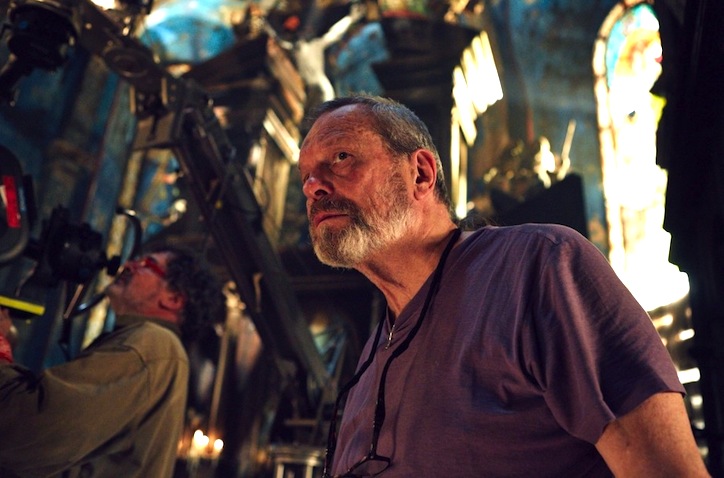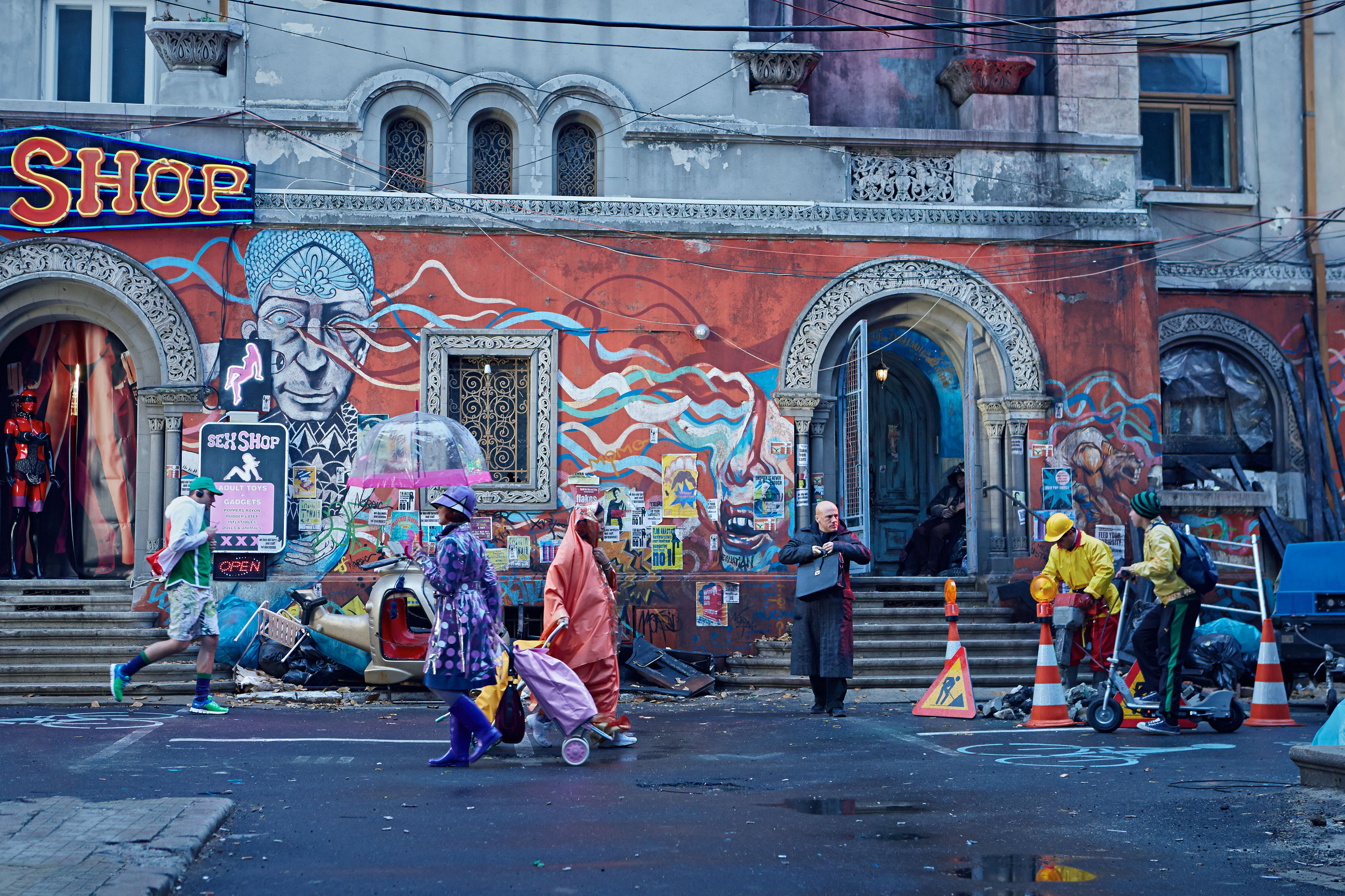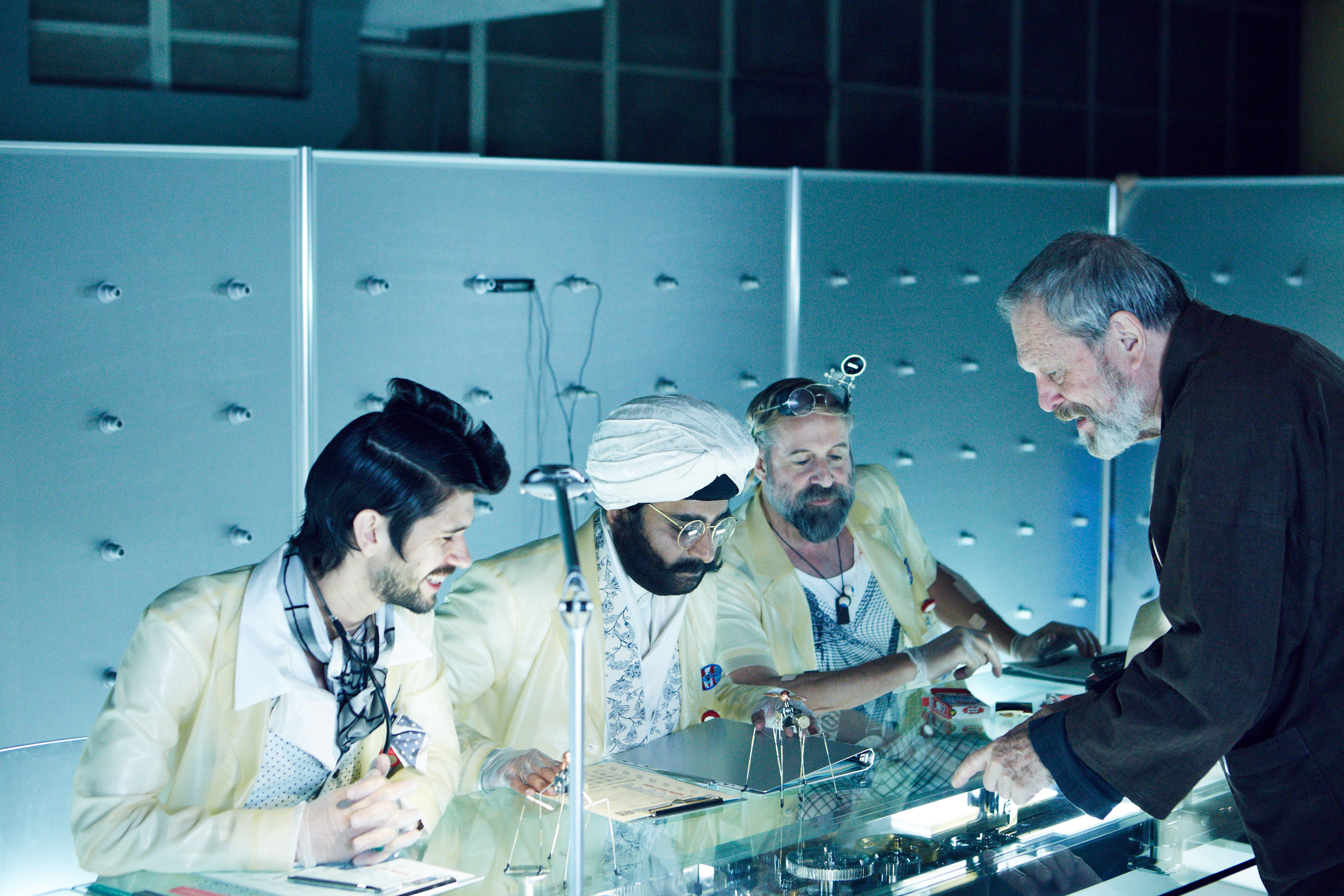By providing your information, you agree to our Terms of Use and our Privacy Policy. We use vendors that may also process your information to help provide our services. This site is protected by reCAPTCHA Enterprise and the Google Privacy Policy and Terms of Service apply.
Terry Gilliam on Why ‘The Zero Theorem’ is the Most ‘Extreme’ Film He’s Made and Where He’s at With ‘Don Quixote’


Terry Gilliam is in some kind of zone. On a pristine, 65 degree December morning in Marrakech, Morocco, I find him sitting alone on the back patio of the Mamounia Hotel, listening to birds. He seems happy to have company, yet might have been even happier had he been left to commune with the elements.
Solitude is something that the 73-year old filmmaker has been thinking a lot about lately. His new film, “The Zero Theorem,” which screened the night prior at the majestic Palais des Congrés (after premiering at the Venice Film Festival in September), is about a reclusive computer programmer (Christoph Waltz) in a near-future alternate reality, whose solitary but perfectly satisfying work-at-home routine is disrupted by a dream-girl call-girl, a tween-aged hacker, and a mind-scrambling assignment from “Management” (Matt Damon) to prove that life is meaningless.
The film was written by Pat Rushin, but bears all the marks of a Gilliam production (wide angle lenses and canted camera angles, surrealistic gadgetry and high-ceilinged sets), and revisits some of Gilliam’s most prevailing preoccupations (the thin line between reality and fantasy, past and present, independence and order). In form, content, and tone, the film recalls Gilliam’s 1985 masterwork, “Brazil,” a comparison that suggested a fitting start to a conversation that flowed from religion to social media, and from low budget resourcefulness to the revival of the long-delayed “The Man Who Killed Don Quixote.”

During “The Zero Theorem,” I thought of the opening title card in “Brazil”—”Somewhere in the 20th century.” This film is more like “Somewhere in the 21st century.”
It is. Funny enough, three years ago I was talking to Tom Stoppard, and we were wondering how do we make a contemporary “Brazil”? Neither of us knew what to do, because it’s so amorphous now, the world that we live in. This script was floating around before that, and there were lots of interesting ideas in it—I liked it for the maze of it. I sort of adapted it to bring in other angles. In the script the world was a very grey world, a Kafkaesque, oppressive thing. But I thought no—the world is now all light and color and fun. And that’s what’s more disturbing. I’ve heard it said that it’s like “Brazil” because it’s political, but no—it’s about corporations, not governments. Where’s the power now? It’s in corporations. Governments are secondary in the whole process. Except for maybe when you’ve got a monarchy. When you’ve got maybe a philosopher king. They really like the king here [in Morocco]. He cuts through all the problems of democracy. Democracy isn’t functioning at the moment, I really don’t think. Look at America.
The money is what changes things.
The money is buying all of the politicians. But the king is rich—he can’t be bought. And he’s making good decisions. And they’re very proud of it here. As far as the Greeks understood, we have the republic, and then when it fails, the tyrant comes in, until the tyrant becomes too overbearing and the republic comes back. And it may be going on and it’s not been defined very clearly. I don’t know how you make films about this, so I don’t. I talk about it with you.
Well it undergirds a lot of what you’re doing.
That’s it. The thoughts are down there. And if they find a little way of expressing themselves or not, it doesn’t matter. But it’s a viewpoint of what the world is like.
I liked in the film how we’re deep enough in the modern computer age that there can be retro aspects that aren’t even that old. That virtual reality is a retro concept.

Isn’t that weird? My thing is that the future isn’t waiting for us to get to it, it’s coming at us. It’s going that way [motions past us]. That’s my theory. Take Liquid Memory, which is this thing in the film. Now I don’t know what the fuck that means. Then I’m reading in the paper about DNA as an organic form of memory, which is getting close to, yes, liquid memory. I just like mixing it up. That’s what I don’t like about most sci fi films. I don’t particularly like sci fi and I never think I’m doing sci fi. The past, the present and the future are altogether all the time. We live in an age when I’ve got one hand on an iPhone, and with the other I’m hand cranking my coffee grinder. That’s the way it is. It’s a mixture. And it’s more fun, anyway, for making silly films.
But I like how irresolvable it all is as a result. It’s more of a permanent state than “where we’re all headed.” It’s more recognizable to us—the future elements—than you’d think it would be. And you’ve got all these blasphemous elements in the film, setting Christophe Waltz’s apartment in an old church, and putting a CCTV camera where the head of the crucifix was, but it actually seems less blasphemous than a paean somehow to a belief system that’s passed, with a new one rising in its place. It seems all wrapped together.
That was the sense. Religion is the old belief system. And what’s the new belief system exactly? Except that’s not quite true, with the fundamentalists and the evangelicals in America clinging desperately to it for meaning. But the new technology, the new connectivity, the new way of communicating, the virtual community, is the new belief. But it’s like, come on. I think connectivity is maybe separating people more than you think.
But there’s the belief that it might bring us together. Which is what’s interesting about Christophe’s character.
He’s a man of faith.

He’s looking for a message in a bottle, he wants somebody to tell him what the meaning of everything is. And that’s never going to go away, you’re never going to stop wanting that.
And it’s what advertising does to us. You buy this three-ply toilet paper and you’re going to be happier, fulfilled, become the real you? You’re inundated with it, but it’s been with us so long. How do you deal with it? That’s all I was really thinking about. How do you find out who you are? The modern human is a neuron. The information comes in, and they get their phone and tweet to their friends. The synaptic gap is done by the tweet. You’re passing information on. It’s what Hollywood agents have always been—neurons in this Hollywood brain. They can’t wait for any information, so they can get on the phone and pass it on. Because it’s power and it shows that they exist. But how do you disconnect and find out who you are? The only way to do it is being alone. He says it very nicely in the film, “I was alone but never lonely.” And that’s an important thing. Aloneness doesn’t mean that you’re lonely, necessarily. It can be very fulfilling. I just sit here, and I love it. Taking all this stuff in. Actually what it does for me—it disappears me. I disappear into the world out there. I’m just another leaf on the tree. I find that modern communication is all about ego. I’m here. I’m having this. I’m talking to her. It’s me.
READ MORE: Here Are Seven Directing Lessons From ‘The Immigrant’ Filmmaker James Gray
A couple of years ago I did an Arcade Fire concert at Madison Square Garden, and it was streamed live across the web. And about a quarter a way through the first song, the tweets were coming through. “This is great!” “Fantastic.” Shut the fuck up. [Laughs.] Listen to the fucking music. Take it in and live it! And that’s what makes you crazy. This film, I didn’t deal with it as in depth as maybe I could have, but there were enough elements there that I could shape them into something that could speak to where we are now. Here’s a man with no control over his life. In a sense he tries, by being alone, but there’s still no control. I don’t know if that’s good or bad.
And is being alone good or bad? He also rejects loving partnership.
That’s the thing. It’s neither one nor the other. Years ago, my son was about 12, and we got a house in Italy, and it’s very basic, it’s on a hill, surrounded by forest. We didn’t have TV, didn’t have phone. And he’s there and he’s bored. But then a couple days into it, he would start doing things, finding things, inventing things. Here’s a stick, and I can make a bow. Suddenly his creativity started blossoming, because the work wasn’t done for him, as in a video game. It was great to see him finding things on his own to make his life interesting. Then of course we got back to London and turns on the television and he’s a zombie again. But for a moment maybe it sticks in his head.
Bruno Dumont said something in a master class the other day that made me think of “The Zero Theorem”—about how the economics of a movie define the aesthetics, yet that doesn’t mean the aesthetics can’t be strong. Now this wasn’t a $100 million film, but it looks really good.
What do you think it cost? Just guess.

If it were a Hollywood film, it would easily be budgeted at $200 million.
Guess.
$15 million?
$8.5 million. And I’m very proud of it. Because people really worked their asses off—they weren’t getting paid. Most of the actors were just paid scale. Matt, Tilda, Ben Winshaw. It was a family film, friends came in, people I’d known or worked with. And we did it in Bucharest, the cheapest best place to film in Europe. Everything had to be invented. The most interesting aspect was the costumes. Carlo Pucciole found outside of Bucharest this Chinese market where there was all this charitable man-made fabric that you bought by the kilo, not by the yard. Horrible shit, which was made into Matt’s suits. Wearing it, he was sweating, it was horrible. But it looked great and it cost nothing. It’s about a very talented person being very clever in very restrictive circumstances. Renault gave us 15 of those cars, but they weren’t enough. In the studio I saw all these golf carts, and we put side panels on them and they became taxis. That was the fun of it, being inventive. It was like my son playing with a couple of sticks in Italy.
Do you think you’ve adjusted to making movies on that scale while still realizing your ambitions?
But I always have [adjusted]. Mine have always been more ambitious than the budgets we’ve had. This was the most extreme, and it’s exhausting—I wouldn’t want to do too many more like it. It kills you. Everybody, for 24 hours a day, is just driven to madness to try to get this stuff done. But it works. There are 250 effects shots in this film, and they were done in Bucharest by this really brilliant guy. People like that wouldn’t ordinarily get a chance to work on a film with Matt Damon and all, but that’s what’s nice when you’re forced to work in places you wouldn’t normally.
Now that you’re done with this one, is “The Man Who Killed Don Quixote” is back on?
Well, we’ll see. My default position at the end of each film is that it’s back to “Quixote.” I’ve got a Spanish producer who is young, and he discovered that the Canary Islands offer a 39% tax rebate. OK, it begins. We don’t have a cast, and we don’t have the money. But I want to be doing it next autumn. We’ll see.
Everyone hopes that it happens.
Oh, it’ll be a disappointment. People’s expectations will be so high, and it will be just another film. But I just want to get it out of my system. Say goodbye to it.
By providing your information, you agree to our Terms of Use and our Privacy Policy. We use vendors that may also process your information to help provide our services. This site is protected by reCAPTCHA Enterprise and the Google Privacy Policy and Terms of Service apply.

















